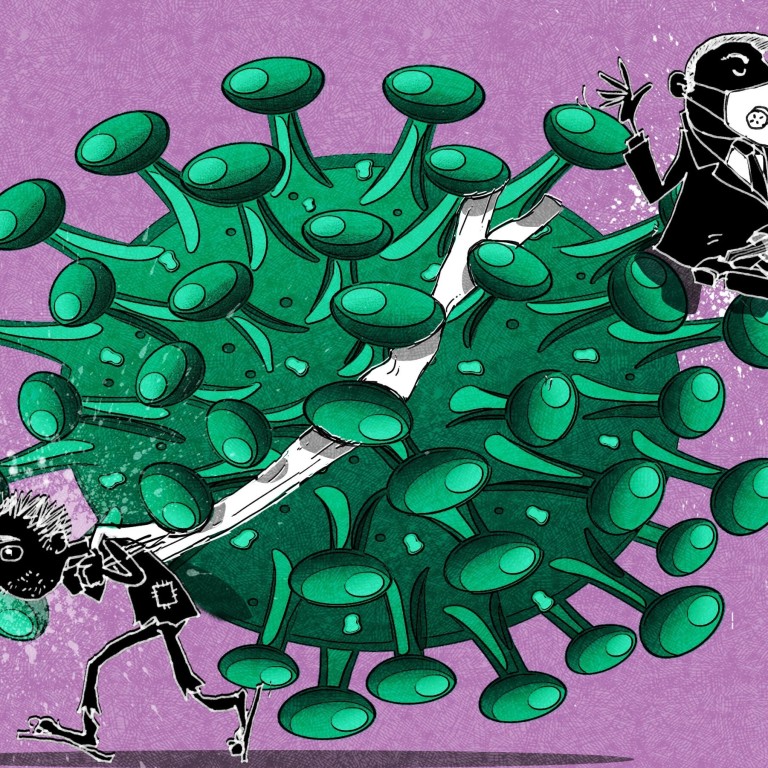
Covid-19 further entrenched income, health, racial and educational inequalities across Hong Kong, experts say
- Society’s most vulnerable have suffered disproportionately during the pandemic, with many low-paying jobs gone, parents and their children confined to tiny homes, and domestic helpers and the poor elderly at heightened risk of exposure
- The government’s response – funnelling money to businesses instead of directly to workers – has only worsened the plight of the lower class, experts say
This is the eighth story in a series on the Covid-19 disease, one year after it first emerged in the Chinese city of Wuhan. It looks at how Covid-19 has exacerbated the inequalities in society, especially for blue-collar workers and the underprivileged, and how government policies have made things worse for them. Please support us on our mission to bring you quality journalism.
In interviews with the Post nearly a year after the health crisis emerged, they explained how the poor fell further down the social ladder, how government policies made the situation worse, and shared their fears of a more unequal post-pandemic world.
Adans Wong was one of more than 20,000 Hongkongers who joined the expanding army of unemployed in February, just a month after the virus arrived.
“I had been living pay cheque to pay cheque before, so losing my job in the midst of a pandemic really hit me hard,” he said.
The 49-year-old had been working four to five days a week as a waiter at a restaurant making between HK$6,000 (US$774) and HK$7,000 a month but was seeing his hours steadily cut as social-distancing measures kept customers away.
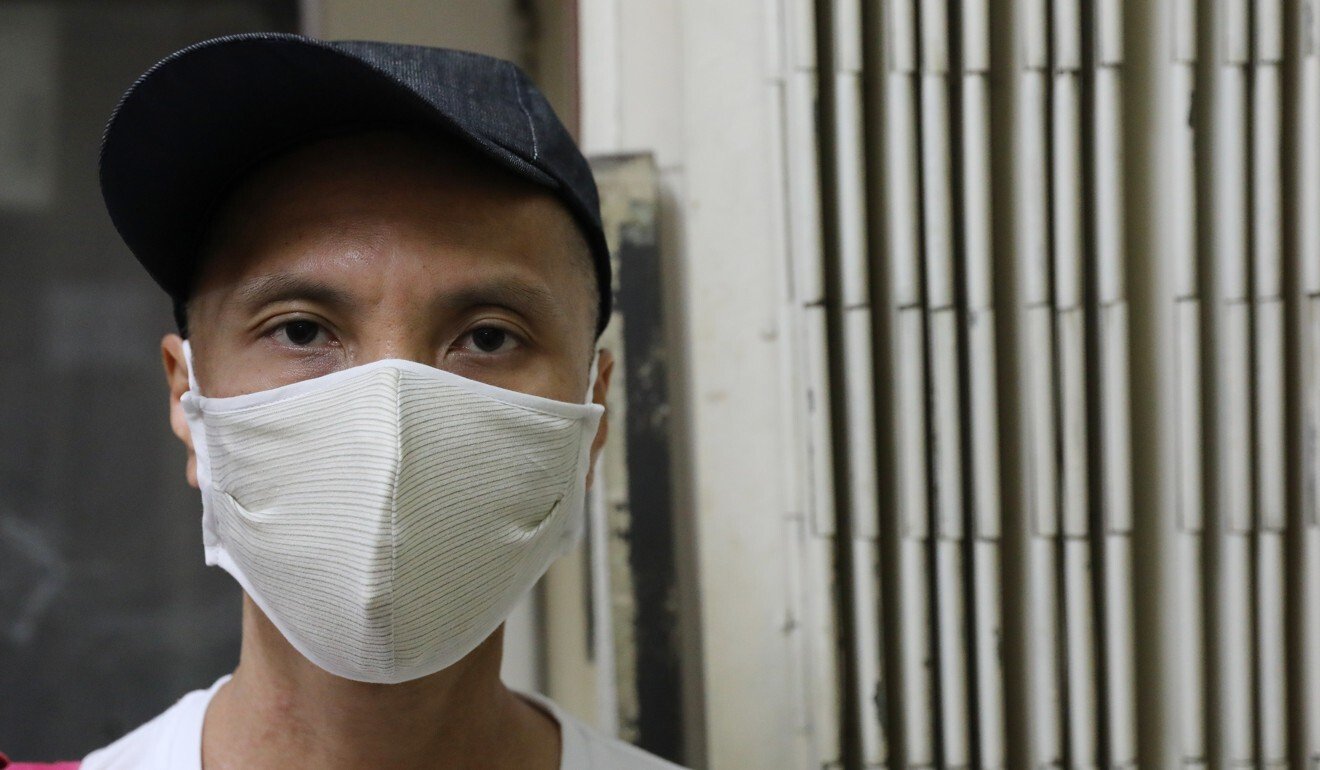
Wong was paying HK$2,200 a month to share a 50 sq ft room in Tsim Sha Tsui with three other people, and after taking care of other bills such as laundry and his mobile phone service, he had little left to save. He lost his job on February 16 after his employer downsized in a bid to stay afloat. Desperate for cash, he turned to a social worker who helped secure an immediate, one-off HK$5,000 handout from an NGO programme for people who had suddenly fallen into poverty.
Wong pursued about a dozen jobs in the food and retail sectors but without any luck. In March, he applied for comprehensive social security assistance (CSSA), means-tested government welfare for those on low incomes.
But he faced a hurdle – civil servants had been ordered to work from home to minimise foot traffic and prevent the spread of the coronavirus. Although some essential and emergency services were kept open on a limited basis, Wong said Social Welfare Department branches responsible for handling CSSA applications were shut except for four or five days a month.
The social security safety net has holes and was not there for me in my hour of need
Wong also found himself having to explain the recent HK$5,000 placed in his bank account. After going back and forth with officials, and resubmitting documents on his financial status along with a copy of his lease, he finally received his first payment of HK$4,800 on May 7, six weeks after handing in his application.
Every dollar counted during the agonising wait and Wong relied on a charity-run food bank for staples. “I got canned beans, cereal and ate bread with soup to make myself feel less hungry,” he said. “I really wanted to throw up because the food was so much the same and boring. It was more terrifying because you don’t know how long the wait would last.”
The experience only reinforced Wong’s impression of Hong Kong as a deeply unequal society. “The social security safety net has holes and was not there for me in my hour of need,” he said. “I was lucky I got help from outside the system, but it shouldn’t have to be this way. The heartless government does not seem to care about us, the poorest members of the community.”
The Social Welfare Department said waiting times for CSSA and other benefits varied from case to case, and the city’s leader has recently named the department an essential service during the ongoing fourth Covid-19 wave and kept it open for welfare claimants.
But Fernando Cheung Chiu-hung, a former lawmaker from the Labour Party and a lifelong campaigner for underprivileged groups, said the government’s failings went far beyond a single department and economic injustices were endemic in the official response to the pandemic.
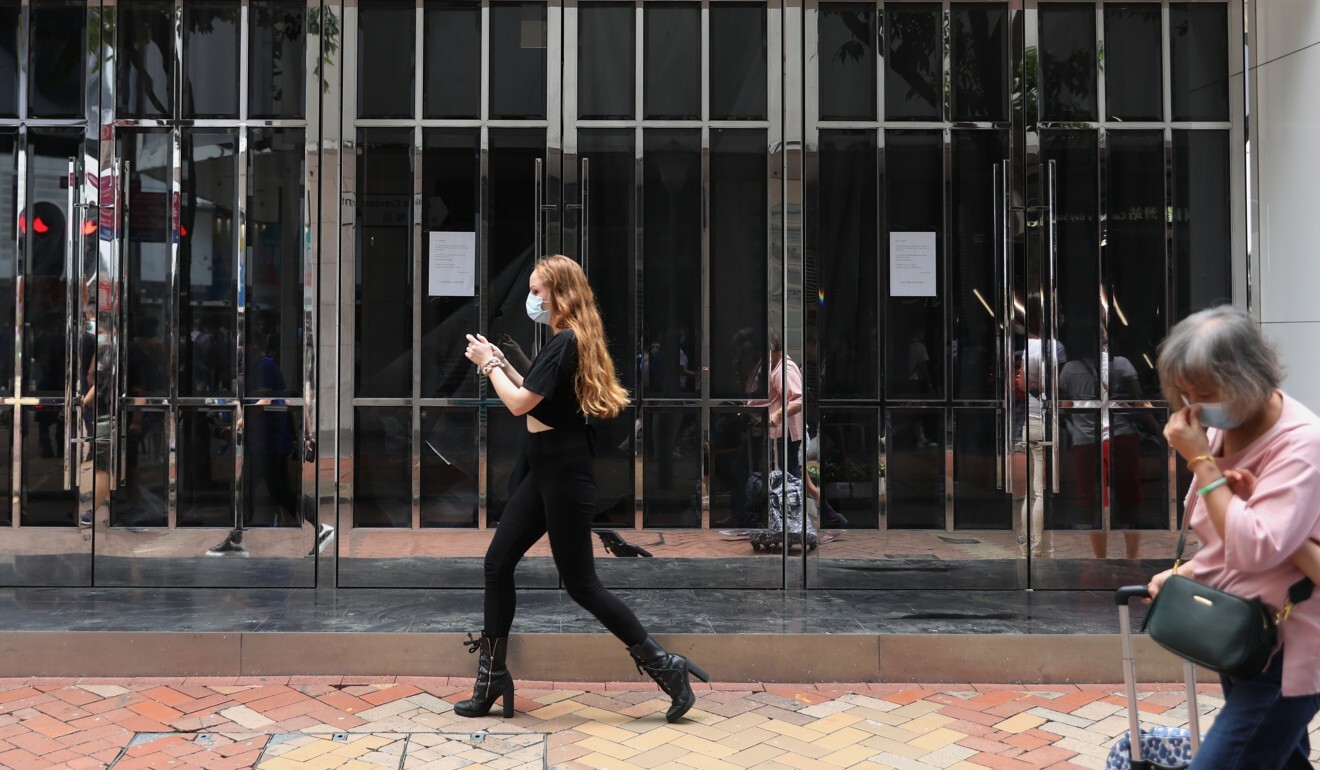
He argued the government’s persistent refusal to create unemployment benefits that were not means-tested during the health crisis and its financial aid package, which centred on a multibillion-dollar subsidies to support struggling industries on the condition they kept their employees on their payroll, were geared towards the already rich and would only widen the wealth gap.
The Employment Support Scheme routed HK$80 billion (US$10.31 billion) and HK$250 million during two previous tranches, the second of which ended earlier this month. The programme, however, had not prevented companies from cutting other employee benefits or their work hours to reduce overhead, Cheung said.
Jobless rate could hit record high, experts warn, as unions seek more relief measures
The picture is equally dire for other sectors. The Hong Kong Federation of Trade Unions released a survey earlier this month of 2,100 residents employed across all professions and found nearly 80 per cent of respondents had either been laid off, suffered a pay cut or forced to take unpaid leave.
According to the latest data from the Census and Statistics Department, more than 1.97 million Hongkongers, or more than half of the 3.85 million working population in the city, were earning less than HK$17,999 a month. Meanwhile, those earning HK$80,000 or more increased from 92,600 people in 2014 to 163,700 last year, a 76.8 per cent jump.
In a pandemic … it is always the poor and the marginalised who lose their jobs first
“I am worried the wealth gap could widen further still, as the second tranche of the employment support scheme has just expired,” Cheung said. “In a pandemic, as in any economic downturn, it is always the poor and the marginalised who lose their jobs first. Only a government redistribution of wealth in favour of the workers can reverse that trend.”
In a now-viral TV interview, a resident of Kwai Shing West public housing estate, where people in one block were required to undergo screening after a cluster emerged, vented her anger at who she viewed as the source of the latest outbreak.
“All Hongkongers now hear the name ‘Kwai Shing West estate’ and think all of us are virus carriers,” she said. “Has anyone thought about who infected us … who made us miss the winter solstice and have no Christmas meals to eat? It’s simple. Go after the singing and dancing cluster. They have money and we don’t. What can we do about it?”
She was referring to a pool of infections that arose out dancing venues frequented by numerous wealthy ladies which has ballooned to 732 cases and is blamed by many as the trigger setting off the fourth wave.
Hong Kong’s businesses expect a joyless holiday season as Covid-19 rules bite
Cheung said the government’s delay in shutting down the dancing venues, as well as other activities such as large parties on private yachts, only fuelled perceptions of an uneven hand.
“It’s always the poor at public housing estates who are woken up at night and hauled to quarantine centres,” he said. “It looks to many that there is one rule for the rich and the powerful, and another for everybody else.”
Dock workers at Kwai Tsing Container Terminals, the largest cluster in the third wave with 77 cases, were also hit hard as many were forced to share cramped resting rooms and bunk beds, he added. “The virus does not discriminate, but economic and social circumstances do.”
Health inequalities could have consequences in a post-pandemic world, he suggested. “What I fear is these inequalities will be perpetuated as rich patients have access to private, quality rehabilitative care like physiotherapies, while the grass roots have a longer road to recovery,” Cheung said.
Racial inequalities are worsening as well, according to Filipino Shiela Bonifacio, who argues migrant domestic workers such as herself had been singled out for blame in the latest coronavirus outbreaks that involved their dormitories, including a cluster centred on a boarding house in Tai Po that saw 14 helpers and their employers infected.
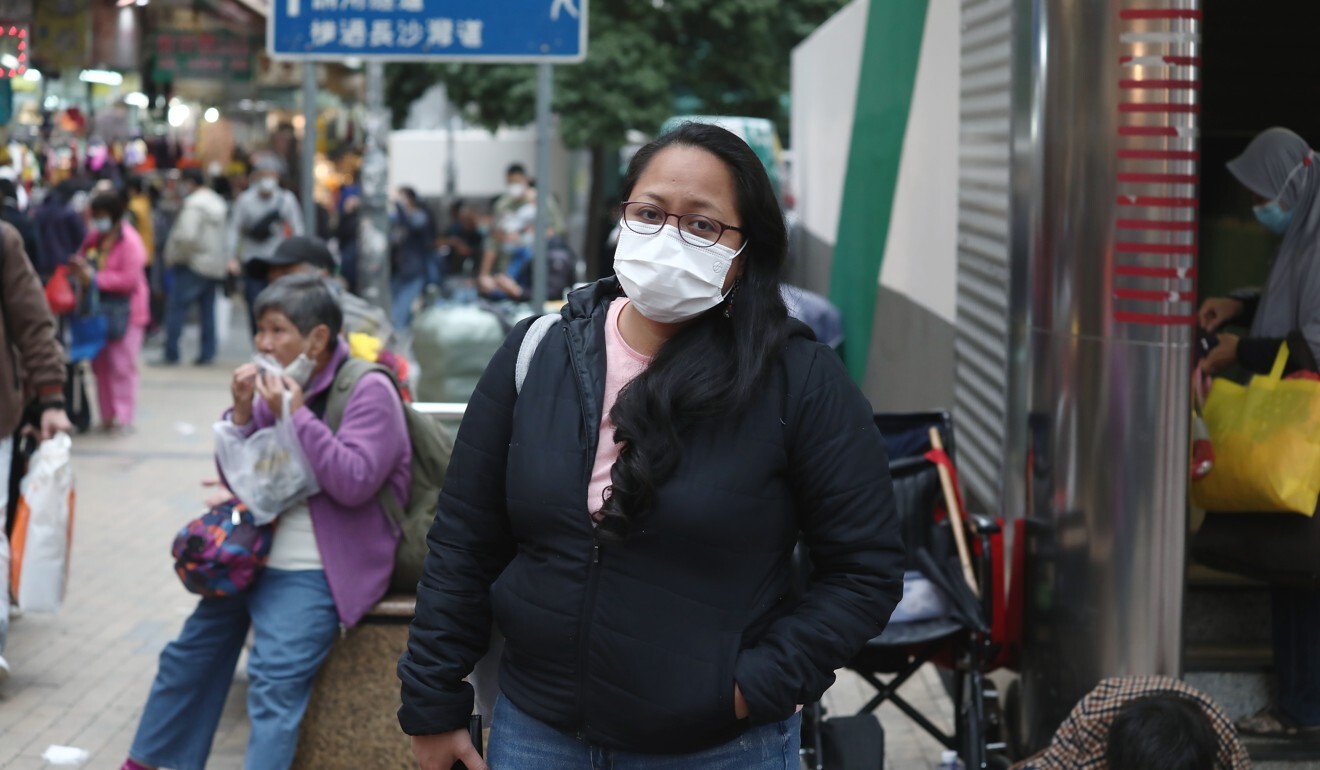
“Not all Covid-19 information is available and accessible to all migrant workers in their native language, but we are always very careful in taking care of our own hygiene and our own health, because if we get sick, it’s not just us that are affected, it’s our families in the Philippines and Indonesia who rely on our earnings here,” said the chairwoman of Gabriella Hong Kong, a group championing migrant worker rights.
Bonifacio also defended domestic workers who visited friends in the dormitories on weekends, which some other locals believed had contributed to the spread of the virus. “We cannot go to a park, or Chater Road [in Central] because of social distancing, so we are forced to find a place to take a rest during our holidays.”
We will not die of the virus, but we will die from overwork
The pandemic had increased their workload, Bonifacio said, noting she now worked from 7am to 7pm with few breaks in between, as her employer was no longer going out every day. The child in the family was also staying home for online classes.
“In order for the employer to work at home, the domestic helper has to occupy the attention of the kids,” she said. At the same time, we also need to finish the daily chores. We will not die of the virus, but we will die from overwork.”
Bonifacio said the message from the government and employers to stay home on their days off to protect themselves from the virus also reeked of discrimination.
“From Monday to Saturday, our employers are asking us to go out to run daily errands, so what’s the difference?” she asked.
Paul Yip Siu-fai, chair professor at the University of Hong Kong’s Department of Social Work and Social Administration, agreed low-income groups such as domestic workers, blue-collar workers and their children have received the sharpest end of the stick during the pandemic.
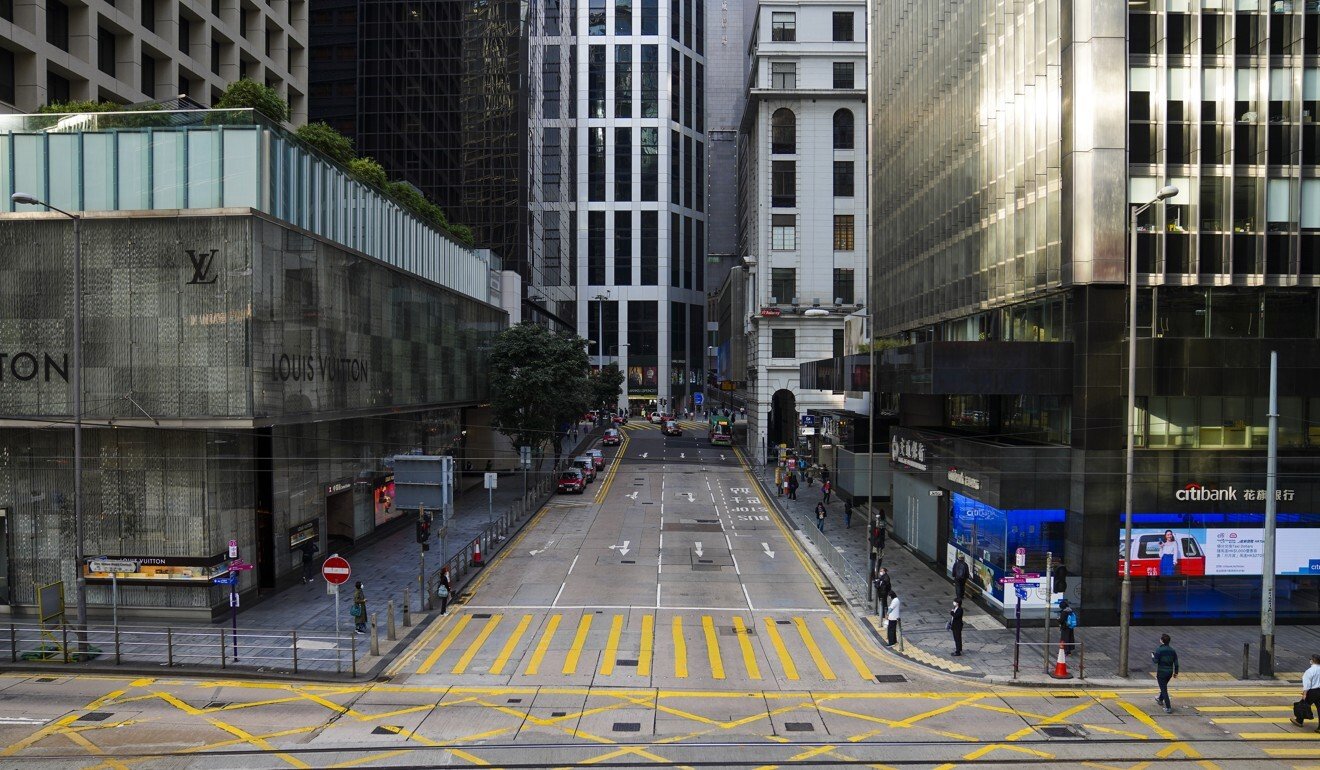
Yip was especially concerned with the impact on their mental health. “Employers who forbid their helpers to go outside on Sundays and public holidays are actually depriving their employees of free time and privacy.”
The government’s response to Covid-19 had failed to take into account its disproportionate effect on those who are less well-off, he said.
“The government tells everybody to stay home, and that’s fine, but they need to grasp the reality of the situation and realise that not everyone’s house is comfortable or big enough to relax or study in.”
For Chan Hung-ying, a 38-year-old mother of three who migrated to the city two years ago, the pandemic also exposed some hard truths about inequalities in education and across the generations.
She lost her part-time job at a restaurant, but what concerns her most was the life opportunities available to her children.
Students without electronic devices could be left on wrong side of digital learning divide
The health crisis has forced schools to close for most of the year and students to switch to distance learning. A recent survey of 900 low-income families by the pressure group Alliance for Children Development Rights found 65 per cent of students had no computer suitable for online learning at home, while 21 per cent said they lacked Wi-fi networks.
In a flat no bigger than 200 square feet, Chan’s eldest daughter, who is in Form Three, uses a borrowed iPad for her online lessons, while her second daughter who just began secondary school uses her mobile phone to learn. Her youngest, still in kindergarten, has no classes now.
“We do not have our own computers with big screens for the lessons,” the mother said. “I am very worried my kids will have deteriorating eyesights and learn poorly.”
Amy Chong, the eldest daughter, said her academic performance had suffered and she had fallen 10 spots in her form. “My English is the poorest, and it’s harder for me to learn via a video link, with all the interactions and after-class questions with my teacher stripped away,” she said. “My classmates from a more well-off background can boost their grades by getting a private tutor, but I can’t afford it. I am worried I may not have the grades I need to choose the science subjects I love for next year.”
Chan said the thought of her children not getting what they wanted in life now kept her awake at night. “We, the poor, have had it rough since January, and right now, I see no hope on how we can rebuild our lives after it.”
Additional reporting by Thomas Shum










